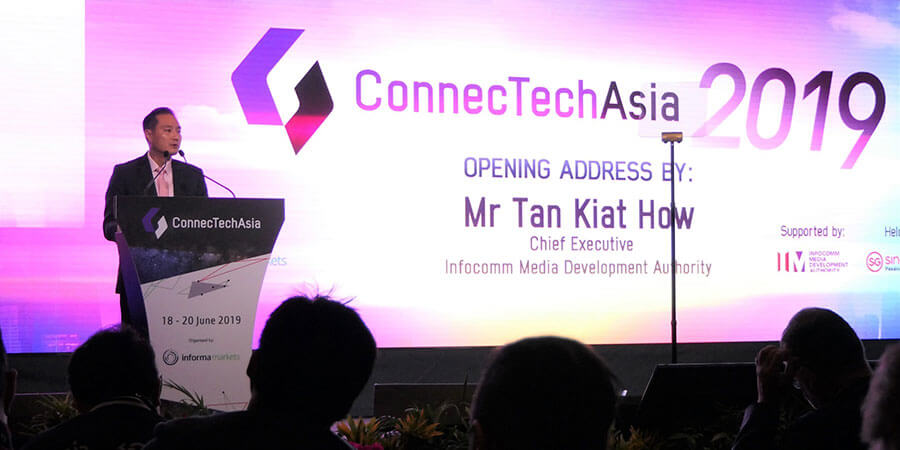Asia’s mega Infocomm, Media and Technology event, ConnecTechAsia 2019 officially opened its doors on June 18th with an official ceremony where the Chief Executive, Infocomm Media Development Authority, Tan Kiat How delivered a keynote highlighting Singapore’s digital transformation journey.
“Last year, the Infocomm Media Development Authority (IMDA) launched the Digital Economy Framework for Action. Our vision is for every business to be digitally empowered, every worker to be digitally skilled and every citizen to be digitally connected,” said Tan Kiat How when referring to the importance Singapore gives to the transformation of industries at a time when digital technologies are rapidly shaping the future.
IMDA CEO went on about the Authority’s efforts in terms of digitization and shed light on the SMEs Go Digital program, which aims to make going digital simple for SMEs, and the TechSkills Accelerator (TeSA) initiative which provides opportunities for non-ICT workers to switch to a tech career, or for current ICT workers to take on deeper tech roles.
“The digitalization of businesses can succeed only if our workers, too, are equipped with the skills to effectively use digital technology”, he said. “The hiring outlook for tech professionals locally remains strong. Based on our Annual Survey for Infocomm Manpower, we project that the demand in Singapore for infocomm professionals will increase by 28,500 from 2018 to 2020.”
In this context, Tan Kiat How emphasized that Artificial Intelligence will be one of the mostly demanded tech skills. According to a 2017 report by Accenture, by 2035, AI could create up to USD$215 billion in Gross Value Added (GVA) across 11 key industries in Singapore. This is almost double the national economic growth rate.
“We are working with our partners to train up to 12,200 Singaporeans in AI skills through various programs, such as the AI Apprenticeship Program (AIAP), AI for Industry (AI4I) and AI for Everyone (AI4E). We are rolling out such training programs in other areas, such as cybersecurity,” he added.
An important topic he pinpointed was the need for a responsible and accountable use of AI. He explained how the IMDA is implement that in order to further enhance Singapore’s investment in AI.
“We have been working on several initiatives to promote the responsible and accountable use of AI. One example is the Model AI Governance Framework, released earlier this year for adoption and feedback. The Framework is the first in Asia to provide private sector enterprises with readily implementable guidelines on how to address key ethical and governance issues when deploying AI solutions. The Framework exemplifies Singapore’s commitment to invest and build capabilities in AI.”
5G was the final topic addressed by the IMDA’s CEO. He talked about Singapore’s 5G journey which started off a couple years ago and explained how Singapore perceives 5G.
“Singapore sees a different 5G use-case from that of other jurisdictions, which tend towards using 5G for high-speed fixed-wireless last-mile coverage. Instead, we envision 5G as an enabler to support the development of new innovative applications and services that will power our Digital Economy – a public utility that will benefit our entire economy.”
To conclude, he said, “The public and private sector can, and must, work together to achieve our shared goals of harnessing the full benefits of digitalisation. The speed of innovation and novel policy questions that accompany such technology changes demand this.”





